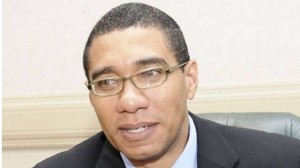 As calls mount for a resumption of the death penalty in Jamaica for convicted criminals, Prime Minister Andrew Holness says his view on the penalty for murder has evolved, given the barbarity of the acts of criminals who, he said, “have no heart”.
As calls mount for a resumption of the death penalty in Jamaica for convicted criminals, Prime Minister Andrew Holness says his view on the penalty for murder has evolved, given the barbarity of the acts of criminals who, he said, “have no heart”.
Holness, speaking in a sombre but firm tone at a post-Cabinet press briefing on Wednesday, said these criminals must be “removed” from society, and the highest possible penalty imposed on those who commit murder.
“My own view on the penalty for murder has evolved,” said Holness moments after announcing a state of emergency (SOE) for St James, which is in response to the murders of two schoolchildren while they were travelling in a taxi in St James on Monday.
“I was never a supporter of the death penalty, but the more I study this matter and begin to understand the minds of the criminals, there are no souls there, (and) they have no heart,” declared Holness.
He added: “They (the criminals) need to be removed from among us, but I am not here to get into a debate about jurisprudence on this matter (the death penalty).”
However, the prime minister said that within the limits of that jurisprudence, “the highest, highest penalty possible should be applied and, currently, the penalties now are not a deterrent”.
Holness’ views follow a call in the House of Representatives on Tuesday from South West Clarendon Member of Parliament (MP), Lothan Cousins, for Jamaica to “focus greatly on the imposition of the death penalty”.
The victims of Monday’s grisly gun attack in Salt spring, St James, have been identified as seven-year-old Justin Perry and nine-year-old Nahcoliva Smith, and a 26-year-old man, Tevin Hayle, otherwise called ‘Bancel’. They all resided in Salt Spring.
The three were shot dead when a gunman opened fire on the taxi they were travelling in about 5:20 pm, at a section of the Flower Hill main road in Salt Spring.
The police have theorised that Hayle was the gunman’s intended target.
The death penalty has been effectively halted in the Caribbean. It was last carried out in Jamaica in 1988 and in Trinidad and Tobago in 1999.
The derailment of the death penalty in the Caribbean started in 1993 with the landmark ruling of the United Kingdom-based Privy Council in the Jamaican case of Pratt v Morgan.
The UK law lords ruled then that it was inhumane and degrading to hang someone after more than five years on death row.
While not commenting on Cousins’ call, Holness took note of the arguments being bandied about that if the Government should increase the penalties for certain crimes, including murders, there will be overcrowding in local prisons, or persons will not plead guilty to such offences, resulting in a backlog in the courts.
In suggesting that there was some validity to the arguments being put forward, the prime minister said those persons who carry such views should be aware that Jamaica’s incarceration rate is the lowest in the region.
“For a country that has so much crime, our incarceration rate is amongst the lowest. Is there a correlation there? It needs to be studied,” Holness argued.
He later dismissed the arguments, however, and gave his committment that “air-tight cases” will be brought against criminals, pointing to the investments already being made in the crime-fighting arena and the relevant infrastructures.
“Now is the time for the nation to speak in one clear voice to the soulless, heartless criminals amongst us, ‘We are going to remove you from our community’,” Holness said.
“Let us get the toughest measures in place,” he added.
